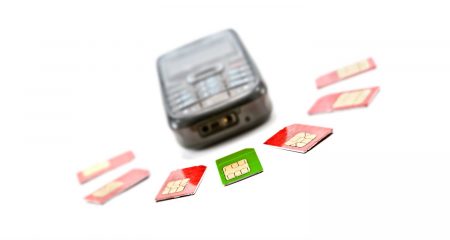 One of the main aims of the Regulation of Interception of Communications and Provision of Communication Related Information Act of 2002 (known colloquially as Rica) was to allow authorities legally and appropriately to track down, or intercept, communications linked to criminal activities and attribute these to an individual, company or group. Rica, which only fully came into effect years later, is best known for doing this in terms of the regulation of mobile network Sim cards for cellphones.
One of the main aims of the Regulation of Interception of Communications and Provision of Communication Related Information Act of 2002 (known colloquially as Rica) was to allow authorities legally and appropriately to track down, or intercept, communications linked to criminal activities and attribute these to an individual, company or group. Rica, which only fully came into effect years later, is best known for doing this in terms of the regulation of mobile network Sim cards for cellphones.
The legislation requires Sim cards to be registered to an individual, along with that person’s physical address. This measure is meant to allow authorities to trace a number identified during a criminal investigation to an individual, company or group to whom that number is registered. However, 21 years since the legislation was first introduced, the evidence available seems to suggest there is a flaw in its implementation.
Crime, of all varieties, has unfortunately long been an issue in South Africa and in the post Covid-19, load shedding-stricken economy, recent crime stats show the problem is only escalating. In this environment, police need to be able to rely on all the tools at their disposal when investigating criminal incidents, and one of these tools should be Rica.
While there is unfortunately a lack of data on how many criminal investigations have either been assisted or impeded by poor compliance or non-compliance with Rica, media reports on crime stories frequently point to unregistered Sim cards as a challenge for criminal investigations. Moreover, journalists have undertaken their own investigations and run stories on just how easy it is to acquire unregistered Sim cards.
A news article published in 2020 reported that illegally registered Sim cards in South Africa were hampering investigations by the South African Police Service. According to the article, a source claimed that police investigations up to that point had uncovered thousands of unregistered Sim cards that were available for as little as R5 each. The article further reported that, according to its source, police could trace numbers involved in criminal activity back to a legitimately registered individual in only about 10% of cases.
Another report from 2022 cites police sources in inner city precincts who have stated that the Sim cards used by criminals are mostly sourced from informal stores, like spaza shops; however, these sources also implicated formal business sellers of these products.
Serious and violent crime
The result of this easily accessible market for unregistered Sim cards is the all-too-easy and consequence-free coordination of all kinds of crime, including serious and violent crime. This means that for the cost of a few of these R5 unregistered Sim cards, planning a murder, for example, becomes untraceable by the police through Rica, and thus virtually risk-free.
Yet another news report from December 2022 covered the politically linked assassination of AmaZulu Prince Mbongiseni Milton Muntukaphiwana Zulu, together with his bodyguard, in KwaZulu-Natal as well as numerous other politically linked killings in the province at the time. Mary de Haas, a monitor and academic, who spoke about the political “hits” in the province, described them in a similar fashion as “so easy”. De Haas specifically mentions the use of unregistered Sim cards in relation to these murders, which are believed to be linked to hitmen in the taxi industry.
Read: I bought a new Sim card that was already Rica’d by someone else
An unregistered Sim card was also reported in coverage of death threats made against Eskom’s chief operating officer, Jan Oberholzer, last year. If one thinks about any type of crime in a technology-driven world, the use of a cellphone is likely involved. Given the ease with which unregistered Sim cards seem to be available, this makes this facet of planning crime, from fraud through to murder, easy and almost impossible to trace back to a source without any other evidence.
Under Rica legislation, telecommunications companies are required to register the users on their networks. This has often been a responsibility which networks have delegated to distribution companies and Rica agents. Somewhere along this chain of responsibility, it is clear that something is going seriously wrong. The pre-registration of Sim cards is further enabled by a deterioration in the built-in security features that should be included in Sim card packaging. The result is the mass sale of non-tamperproof and easily visible Sim cards that can be replicated by bad actors and used in criminal activity.

As a result of these lapses in Sim card security, one of the investigative reports into the availability of unregistered Sim cards noted that when tracing numbers used in criminal cases, details were often just a mixture of numbers and letters that meant nothing. This shows that somewhere in the process of distributing Sim cards and registering the details of mobile network users, actors with access to the Rica registration system are purposefully contravening the law with impunity.
In a country that is beset with serious crime challenges, and having recently been grey-listed by global financial crime watchdog the Financial Action Task Force (FATF), it is clear that implementation issues associated with Rica and the proliferation of unregistered Sim cards are an important avenue which warrants further serious investigation.
This non-compliance represents a serious loophole that criminals can exploit easily with little fear of consequence. Rica should provide the police, who are already seriously resource-constrained, with reliable information in the majority of cases where cellphones are linked to a crime. It’s clear that a review of the act’s implementation with the aim of identifying where unregistered Sim cards are entering the system is well past overdue.
- Natasha Mazzone is Democratic Alliance shadow minister of communications & digital technologies




